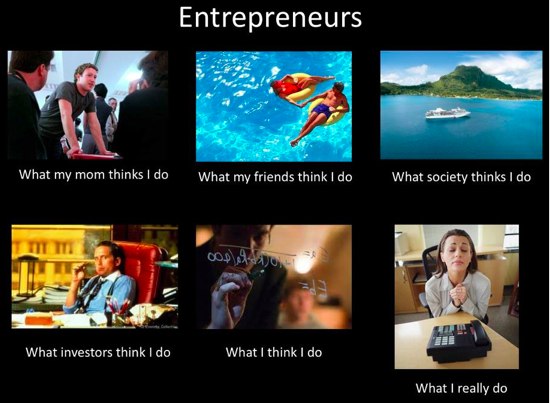Just saw this on Michael Rubin’s Facebook stream. Amazing. And totally accurate.

I’d just add one more – “What Nick Bilton thinks entrepreneurs do” (just kidding Nick, you know I love you):

Just saw this on Michael Rubin’s Facebook stream. Amazing. And totally accurate.

I’d just add one more – “What Nick Bilton thinks entrepreneurs do” (just kidding Nick, you know I love you):

 Don’t get mad at companies because they apologize so quickly. It’s the only way to survive in the Internet.
Don’t get mad at companies because they apologize so quickly. It’s the only way to survive in the Internet.
“All this social media nonsense is destroying our community,” a prominent venture capitalist told me on the phone a couple of weeks ago. It was a throw away comment in a larger conversation, but he was talking about how quickly startups are humbled by dramatic but ultimately superficial press stories that explode out of nowhere. Like a meth-fueled mob of millions tearing through a city and destroying anything that pisses it off.
That mob has incredible destructive power, but it peters out very quickly. If it gets fired up enough it can focus on a single issue like SOPA for a few days. But as soon as it senses defeat, as soon as the target rolls over and shows its unprotected belly, the mob declares victory, gets bored and moves on.*
So is it really so surprising that anyone who finds themselves the target of the mob just immediately rolls over and gives up? And the way to roll over is an unqualified apology, backed up with a short and easily understood explanation of how such a thing will never happen again. Don’t use any big words, and for the love of God don’t try to justify any part of what happened.
One example: Airbnb’s press fiasco last year went away only after an unqualified apology.
So you shouldn’t be surprised that Path went that route as well, issuing an unconditional apology last week for downloading your address book without permission. CEO Dave Morin’s attempts at first to explain what was going on made the mob murderous. Much better to simply say you’re sorry, back it up with the deletion of the offending data, and lay low for a couple days.
Nick Bilton at the NY Times doesn’t seem to get the big picture here. He writes about the Path situation, saying “Mr. Morin seemed unconcerned about how people could be harmed by his company’s carelessness” and “It seems the management philosophy of “ask for forgiveness, not permission” is becoming the “industry best practice.”
That’s not quite right. First, it’s more than a bit of a stretch to suggest that carelessness by Path could lead to “roundups and arrests” or dissidents in Egypt. My educated guess is Path is unlikely to sell, or give, any user data to the Egyptian authorities. Instead, they were using the data to make intelligent friend suggestions, which is significantly less evil.
But more importantly, Bilton seems to think that companies do this kind of thing for some nefarious purpose, thinking they’ll just apologize if they get caught and everything will be fine. That plays to the crowd but it isn’t accurate.
The truth is that startups are always in a hurry and always make mistakes. A good CEO knows that she must remain nimble and prepared to deal with the fallout of those rushed decisions. And the mob has taught those nimble CEOs that a nuanced discussion is not what the mob wants to hear. They want to see that belly.
So the belly is shown.
Bilton seems to think that these CEOs are pulling a fast one on us, getting away with bad behavior. But what he really should lament are the lost conversations that could be had. In the Path situation there was a fascinating conversation about why Apple allows this data to flow out without user consent that never happened. Or why, if address books are so important (dissidents in Egypt!) companies like Facebook are still allowed to use it as their own personal property in any way they wish.
So instead Bilton tries to stir the crowd again. Which is fine because he also noted the very real trend of startups to just apologize, and fast, when the mob looks their way. I’m not sure things will change, though. The mob just can’t stay mad when they see that belly.
Pretty soon all we’ll have is an Internet landscape of people who’ve laid down in submission, when those people should be proudly pushing forward, trying new things, and making us, even the Egyptian dissidents, all better off.
Instead of attacking the apologizers, Nick should use his platform to lament the fact that we’re all being trained to apologize because it’s pointless to have a conversation with a mob.
…
Just a couple of additional thoughts here. First, sometimes an unconditional apology is the only solution, and I’ve done it at least once. But I don’t apologize just because a mob is after me. That’s easier to do as an individual, harder when you have a startup with employees and investors. Second, I am always fascinated by Facebook, which has had to deal with so much criticism over the years. The one time I think they really did need to apologize to the community they didn’t, and the issue still went away quickly.
Also, the “*” above – the whole rolling over on your belly thing reminds me of a scary day with my dog Laguna. I was taking her for a walk in a neighborhood. Up ahead I saw an unleashed pit bull laying in front of a house. We gave it a wide berth, walking in the middle of the street instead of the sidewalk. The pit bull rushed her anyway, silently, and hit her head on and knocked her over. Laguna, being the docile retriever she is, rolled on her back and submitted completely. But the pit bull didn’t stop, it was tearing into her stomach and Laguna screamed and it sounded like a human screaming. Without thinking I kicked the pit bull in the head as hard as I could, which was pretty hard. It became airborn but landed squarely and looked at me with emotionless eyes. For a moment I thought it was coming for me. But it turned and trotted off, and didn’t give us another thought. Laguna was shaken up but was ok.
Nick Bilton is like that pit bull (in the same way that Path is endangering those dissidents, which means not really). He didn’t weigh in and attack until his prey was on its back and showing its belly. A safe way to conduct business, but not very noble.
Disclosure: Both Path and Airbnb are CrunchFund portfolio companies. We don’t own any Facebook stock, but their privacy snafus have also failed to incense me.
Update: Wow, an epic rant by MG.
VEVO, a music label joint venture, got caught with its pants down by TechCrunch’s Jason Kincaid – They illegally streamed a NFL game at a party they hosted at the Sundance festival. Yes, this is just too deliciously, hypocritically juicy.
In other circumstances whoever was responsible would face severe criminal and civil penalties for copyright infringement.
Unless, and I’m quite serious about this, the copyright laws apply to everyone, then they shouldn’t apply to anyone. The only way for the legislators and copyright holders who are fighting for tougher copyright laws to maintain any credibility whatsoever is for them to pursue any and all violators, even their own, as aggressively as they pursue everyone else.
Frankly, the VEVO execs should turn themselves in, not fight this in the least, and serve their jail time. I believe they’d serve five years.
See TechDirt for more.
Good for Path – In response to the address book issue from yesterday that sent the tech press into a romper room hissy fit (no offense, hissy fits are fun sometimes), they’ve decided to take the very simple and most effective remedy: nuking all the data.
Path’s blog post on the decision is here.
This is exactly what I recommended yesterday, although Path had come to the same conclusion independently. I had reached out to CEO Dave Morin before I posted last night but didn’t reach him. But we spoke very early this morning and he told me that they had already begun deleting all the data, well before I wrote my post, and would announce it later today.
As my partner MG Siegler says, there was absolutely nothing nefarious about this, but it shouldn’t have happened regardless.
I’m extremely proud of the way the company handled itself yesterday and today, and I’m more proud than ever to be an investor. Companies (people) screw up all the time. It’s how they handle themselves in a crisis that shows what they’re really made of.
 The story of the day is definitely about Path (a CrunchFund portfolio company). The company has been copying address book information to their servers without user knowledge.
The story of the day is definitely about Path (a CrunchFund portfolio company). The company has been copying address book information to their servers without user knowledge.
The company was apparently already aware of the issue and was taking steps to address it prior to this post coming out. The Android app has an opt-in, and a version of the app with an opt-in is awaiting approval at Apple, says CEO Dave Morin in the comments to the original post. Morin has also flat out apologized.
This is a common problem with apps, due in large part to the fact that Apple doesn’t consider the data as sensitive as, say, location information. To get location info the app must alert the user and get their permission on screen. There’s no such requirement for address book data.
There’s an app coming that allows users on jailbroken phones to monitor and intercept when address book information is being exported, at least when it’s being done in the most common way.
A lot of users just don’t care about their address book integrity, they know that it’s been exploited, repurposed, shared and siloed for a long, long time. The argument that Facebook has always made is that it isn’t really your data since it includes personal information of others. So it isn’t really yours to control. The only way that mess ever gets sorted out is the courts, after a lot of guided lobbying-fueled meddling (or lack of meddling) in the legislative branch.
But back to Path. Their apps should soon be opt-in only for address book data, and a lot of users will want to send it to help Path find your friends and invite them to the service. Users can also ask Path to remove the data immediately – “In the meantime, if you would like your data deleted from our servers please contact our service team at service@path.com.”
Which is nice, but I’m wondering if there’s a better solution to this. Path should just state that they’re nuking all collected address book data for all users right now. Remove it from their servers entirely.
It definitely sends the right message to users – you can trust this company with your data. They’ve apologized and they were already in the process of fixing the issue. It seems like the perfect last piece is to remove all that data from their servers. And I doubt it’ll take them all that much time to collect the data all over again, this time with user permission.
And in the meantime, perhaps Apple will begin to protect address book data as closely as they do location data, which would eliminate this problem for users on all apps in the future.
Update: Data nuked.

Recently a startup I know was heavily pressured by Apple to change their iOS app marketing material. The problem? The app was shown with a white iPhone image on their website.
That’s the first I’ve ever heard of Apple freaking out over the color of the iPhone skin in third party marketing materials. I asked a bunch of app developers if they’d ever heard about this, and none of these other developers had. And some prominent apps, like Flipboard and Path, use the white iPhone on their sites.
Apple has clear guidelines on the use of ios device images. There’s no specific rule about using only black device images, but there is a requirement that only approved images can be used. All of those approved images are black.
The private written communications I’ve seen from Apple, though, are quite clear on the restriction. In verbal communications they’ve said that they’re reserving use of the white iPhone for their own marketing materials.
Any other app developers out there that have been pressured by Apple to only use black device images? Dalton Caldwell, the CEO of App.net, works with thousands of developers to help them market their apps. He says he hasn’t heard a word about this. They may, soon.

Luxury vacation home startup Inspirato (affiliate link, see below) has closed another round of financing – $20 million from Institutional Venture Partners, at a rumored valuation that’s significantly higher than the last round of funding closed last October.
This is a significant up round for one of our portfolio companies, and we’re proud to be part of the team.
Our investment last year wasn’t typical for CrunchFund. Most of our investments are in very early stage, often pre-launch, startups. But we’ve earmarked 20% or so of our fund for later stage investments that we see as extremely opportunistic. Inspirato, a company I’ve been tracking since it launched in February 2011, is exactly the kind of company we like to back. We appreciate Kleiner Perkins’ willingness to allow our relatively small investment in the round that they led.
It’s amazing to think of Inspirato as “later stage” when it’s less than a year old, but the company has been absolutely killing it. They take out long term leases on luxury vacation properties and then rent those properties to users at prices that are significantly lower than they can get elsewhere. You can often get a 4-5 bedroom house for about the same price as you pay for a normal room at a Four Seasons. If you’re traveling with a family or friends, it is far less expensive to use Inspirato than even more moderately priced hotels.
This model – “luxury for less” – clearly resonates with customers.
There is a membership fee for Inspirato, and a yearly fee. The company looks to those fees to provide the bulk of operating margins, which allows them to continue to offer rentals at a significantly discounted rate. Cofounder Brad Handler has referred to this as the “Costco model,” where Costco makes money off membership fees while keeping margins on retail goods extremely low.
Now about that affiliate link. As I explained in my blog post when CrunchFund first invested, Inspirato offers its members a $1,000 credit for convincing new users to join. If you sign up with my affiliate link I’ll simply transfer that credit to you. A lot of my friends have already signed up, and I’m happy to give away the credit. We’ll make it up, after all, as investors.
SOPA/PIPA is on the ropes. Senator Reid postponed a vote on the Senate’s version of the bill next Tuesday, and MPAA CEO Chris Dodd is backtracking and humbled.
Yay. We did it, or nearly have.
But Hollywood still has dozens of laws on the books criminalizing file sharing (read this post by attorney Andrew Bridges pointing out how ridiculous the laws are compared to things like jumping the turnstile on the subway.
Congress is the real winner here. They showed that they can and will pass bills that will cause irreparable harm to the tech industry just because Hollywood is willing to pay them off with huge lobbying dollars. And while SOPA/PIPA may be stalled for now, a big part of the reason is that tech companies got into the lobbying game, too.
From that NY Times article:
Data shows that copyright holders and supporters of the bills outspent opponents substantially in the early stages of the debate. But by many accounts the tech industry has stepped up its lobbying efforts in recent weeks. New spending reports expected shortly indicate whether the balance has shifted.
That’s right, slowly but surely, Congress is sucking the tech industry into their world, making us play by their rules. We have to pay them off, literally with cash, or we get slaughtered.
I wrote about how slippery a slope this is, and hoped that we could put it off for as long as possible – see If We Play By Big Government Rules, We’ve Lost.
Well, we’re now playing by big government rules. Congress can set up a fight pit with Hollywood in one corner and Silicon Valley in the other. Who cares what happens. The money will just roll right in.
This is how criminal organizations run protection rackets. Congress is doing just that, only it’s completely legal.
 Delta Airlines. DELTA. Just that word raises my blood pressure. After a decade of below average flying experiences on that airline, the fan really hit the poop in 2010 on flight 1843 from JFK to Hell.
Delta Airlines. DELTA. Just that word raises my blood pressure. After a decade of below average flying experiences on that airline, the fan really hit the poop in 2010 on flight 1843 from JFK to Hell.
A joyless staff told me I couldn’t bring a very reasonably sized carry on to the plane, citing FAA regulations (that they made up on the spot) (it fit very nicely in the overhead). When I said I was in first class they relented, which is when I understood how bad the service was. What class you’re in has no official bearing on the size of your carry on. That’s all FAA rules, supposedly.
Anyhow, on that flight back they just lost my checked bag (lost everyone in first’s checked bags) and refused to deliver the bags to my home once they figured out where they were. I had to pay them a (large) fee to fedex it a few days later.
All of that, combined with a really low budget, cramped and dirty internal layout that had seen its best days in the late 80s. And the cherry on top – the absolute glee I observed from attendantes and gate crew in making what should have been a pleasant experience a hellish one instead.
I vowed never to fly Delta again, no matter what.
I flew Delta again today.
They were the only carrier with a direct flight to New York out of Seattle that left mid day. It was take that, or fly Virgin with a stop in San Francisco, or wait until the next morning for one of the other airlines. I nearly went with Virgin, but didn’t. I bought a ticket on Delta.
On arrival at the ticket counter I had one employee giving me the “why are you so stupid” routine because I was in the wrong line, but after that things were nice. Easy through security. An efficient boarding procedure and there was my seat, 1B, right at the front of a very nice 767. Unbeknownst to me Delta has ripped the guts out of some of their 767’s and turned them into really nice layouts.
If you’re flying Delta, get on one of these planes. Huge bathrooms I can stand my 6’4 frame up in, and I swear they’re piping perfume or something into them to keep them smelling reasonable. The sitting pod is extremely comfortable and I made good use of the massage feature. Watched two goodish movies. And best of all…gasp…my flight attendant smiled at me and asked if he could get me anything.
I have never seen a Delta employee smile before today. It was a very nice feeling. I bet he would have given me champagne, had I asked, without diverting the airplane to Tampa for an emergency landing.
We were stuck on the tarmac for ages – hitting the three hour limit and then three people asked to deplane, causing a further delay. But we still landed in JFK within about 30 minutes of our original schedule, and everyone seemed to be making their connecting flights. I was all ready to sit down and write a glowing report on my flight since I went so hard on them last time.
Then….baggage claim.
The flight landed at 11:18 pm. The first bags came out 40 minutes later. Mine came out just after midnight, so about 48 minutes after landing. People were pissed off, wondering (correctly) if anyone at all was dealing with the baggage. At one point a small purple bag came out and drifted around unclaimed and disappeared. Nothing else came for at least ten minutes after that.
“They’re totally just fucking with us,” the guy next to me said to my face. “They don’t care at all.”
“Well, it’s Delta,” I said. I mean, my grandpa always told me not to go asking for a beating and then act surprised when it’s promptly delivered.
And that’s how the trip ended. A very nice flight, delayed but not because of Delta, and lovely service in the sky. Then they just crapped on us by making us wait an hour for our bags.
Flight from Hell? Hardly. They were a solid C+ today. And it would have been an A, reserved only for Virgin America flights these days, but for the who gives a heck they’ll get their bags when we’re good and ready at the end.
Thankfully I had Twitter to read while I was waiting for that bag. And Michael Hill sort of said it best. “Delta airlines: “We’re not happy until you’re not happy””
Me and the red faced guy next to me got quite a kick out of that tweet.
 In November I wrote about a New York Times article trashing Zynga that appeared to have been spoon fed to them by rival Electronic Arts.
In November I wrote about a New York Times article trashing Zynga that appeared to have been spoon fed to them by rival Electronic Arts.
I particularly remember the quotes by EA’s head of human resources Gabrielle Toledano, including this one: “I expect a lot of game and tech companies will begin recruiting Zynga’s talent after their equity becomes liquid.” And that ridiculous quote by venture capitalist Roger McNamee saying that Zynga would end up a cautionary tale, without any mention that McNamee is friends and a former business partner with the EA CEO.
Well, Zynga’s public now, and their equity is pretty liquid. But so far I haven’t seen too many departures. Or any. But I did notice Zynga picked up yet another EA executive today. Barry Cottle, formerly EVP of EA Interactive and now EVP Business and Corporate Development at Zynga.
Perusing the Zynga executive team page, the company now appears to have six former EA execs on board. In addition to Cottle, there’s Colleen McCreary, Jeff Karp, John Schappert, Mike Verdu and Steve Chiang. Counting Cottle, six of the eleven members of the Zynga executive team were former EA execs.
This isn’t to pile on EA – they’re still a strong company and a little competition is always good for the soul. But the New York Times shouldn’t be so quick, next time, to believe everything that’s thrown at them. Particularly when it’s a competitor doing the throwing.
Has anyone on the EA executive team not sent their resume to Zynga at this point? That’s a question I’d love to know the answer to.
Image Credit: NY Times artist rendering of Mark Pincus in what sources from EA tell them is his true form. It definitely wasn’t something I just drew.